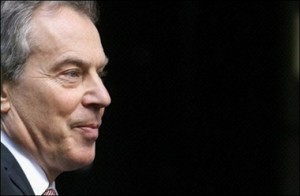 THE prospect of a Palestinian state will come a step closer tonight after Tony Blair gives his endorsement for the proposal and argues that Palestinians are well positioned to establish their own nation.
THE prospect of a Palestinian state will come a step closer tonight after Tony Blair gives his endorsement for the proposal and argues that Palestinians are well positioned to establish their own nation.
The Middle East peace envoy and former British prime minister will present a report in Brussels that examines various Palestinian institutions of government.
A copy seen by The Times concludes: “It is clear that since 2007 the PA [Palestinian Authority] has greatly enhanced its capability to govern and to deliver services … if the PA maintains its performance in institution-building and delivery of public services, it is wellpositioned for the establishment of a state in the near future.”
Mr Blair told The Times: “Palestinian state-building under the Palestinian Authority and [Salam] Fayyad [the Palestinian Prime Minister] is a bright light among a lot of diplomatic darkness. It shows what can be done; how the Palestinians are able to govern a state and therefore the vital importance of re-energising the political process. Palestinian state-building is also an important factor in addressing Israel’s real security concerns.”
Mr Blair’s findings echo recent reports by the UN, the World Bank and the IMF in the run-up to the meeting of international donors in Brussels later today that will review the reforms introduced by Mr Fayyad.
Earlier this week the UN’s Special Co-ordinator for the Middle East Peace process published a report entitled Palestinian State-building: A Decisive Period. Headed by the UN envoy Robert Serry, the report concluded that Palestinians had made marked progress in building institutions needed for a functioning state. It noted, however, that there were still obstacles to overcome, including reconciling the split between the Palestinian government in Ramallah and the Hamas officials who rule Gaza.
The report’s mostly positive review of Palestinian institutions has unnerved the Israeli Government, which is already concerned about a campaign by UN member states to vote for Palestinian statehood; a move that would isolate Israel. More than 100 countries have signed up to recognise Palestinian statehood if the issue comes to a vote in September.
To counter the move Israeli Prime Minister Benjamin Netanyahu is considering a number of concessions, ranging from withdrawing Israeli troops from some contested areas in the West Bank to hosting an international peace summit with the Palestinians. “For years we have known that this was on the horizon, but we have only gotten serious about trying to avoid it this year,” one Israeli official said.
In recent meetings in Washington Israeli officials have pressed the US to vote against the UN resolution and encourage their allies to do the same. So far, however, the US has refused to promise Israel a veto.
One European diplomat who took part in a meeting with Mr Netanyahu this week said that the Israeli leader appeared anxious and was clearly unhappy about the pressure building for a Palestinian state.
He pointed to Israeli press reports that Mr Netanyahu was considering withdrawing Israeli soldiers from the West Bank but the diplomat, who took part in the meeting, said that the withdrawal seemed limited to Palestinian cities. For the past two years the Israeli government had ceded control of several key cities, including Jericho, Ramallah, and Nablus, to local police and military.
The new Palestinian security forces were trained by a US military team aided by British and EU officers. They have had glowing reports by visiting American and European delegations. Recently Israeli officials admitted that the Palestinian forces seemed capable of policing their own territory.
“Netanyahu’s government would not allow him to make any real compromise on the settlements, and it seems nothing less will appease the foreign community and the Palestinians,” an Israeli Foreign Ministry official said. The Australian

Leave a Reply
You must be logged in to post a comment.